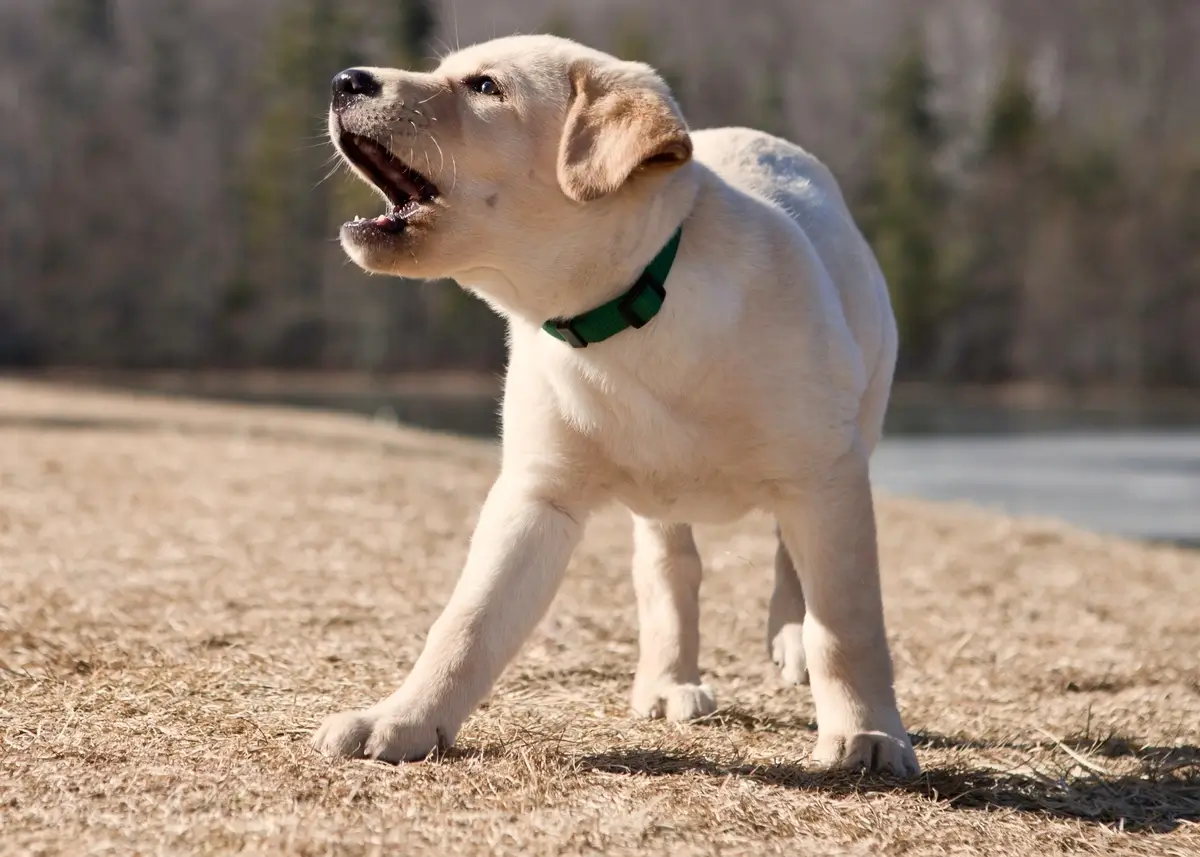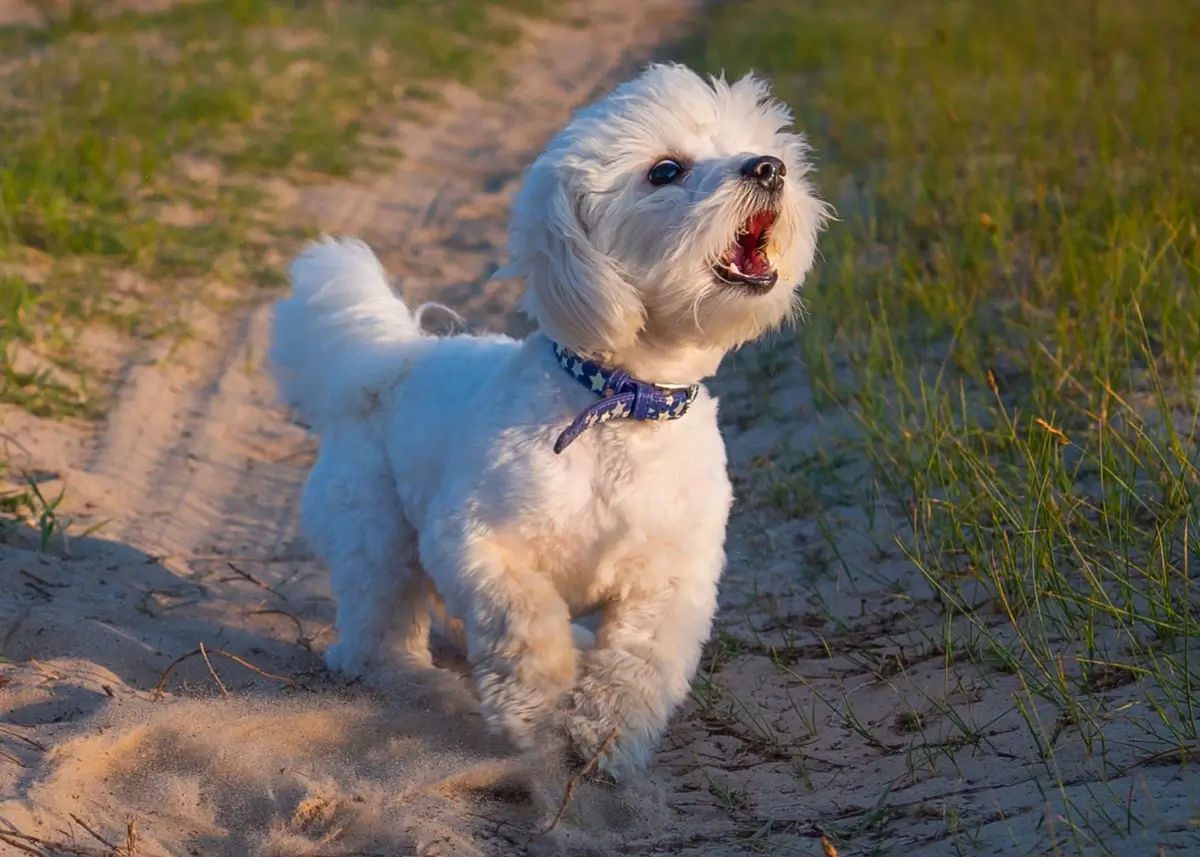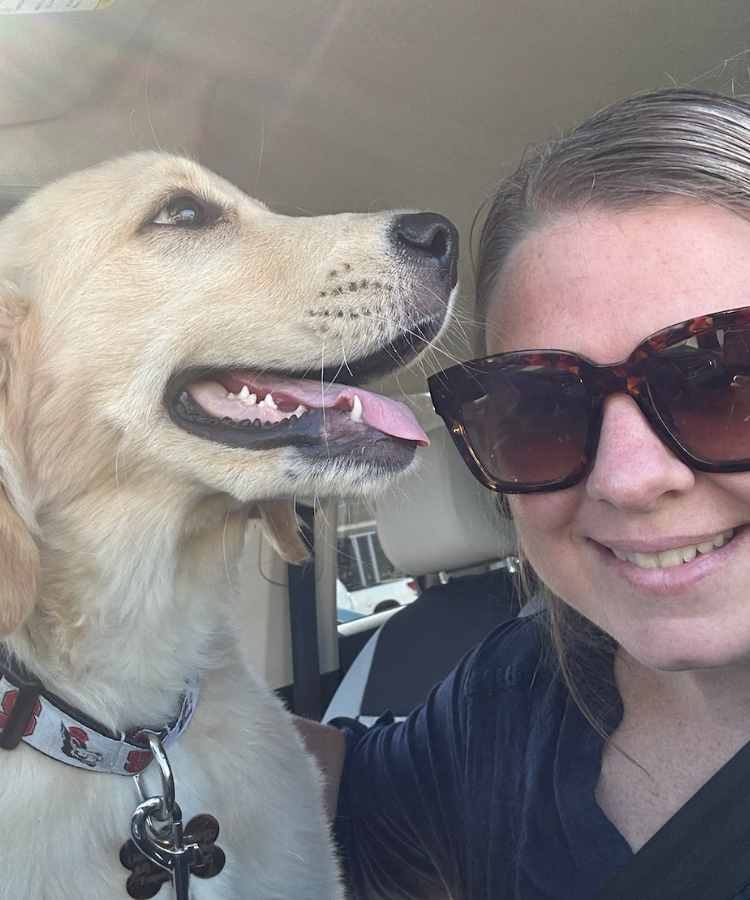When little puppies yip and howl, it can be the most adorable thing. If you have a puppy testing out its confidence against something several sizes bigger and more intimidating than your puppy, the ensuing tiny growl or bark is cute.
Barking is not always a bad thing. A well-placed bark can alert you to actual concerning occurrences around you or let you know your visitor has arrived if you didn’t hear the doorbell. They can alert you that they really have to go outside to prevent an accident.
But what is NOT cute is when your puppy becomes an unruly teenage puppy and barks at everything – even the leaves blowing down the street. Excessive nuisance barking can cause massive distress in humans and may even get you in trouble with your boss and teammates if you work from home, kicked out of your living arrangements, or slapped with a hefty fine if your puppy’s loud off-hours barking violates local noise ordinances.
Barking is a normal part of puppy development, and it’s their primary means of communication. Some breeds are genetically predisposed to bark loudly, such as guard dogs and livestock dogs to alert owners to real dangers regardless of their size. Other dogs can be trained to bark when they detect something specific, such as K9 drug dogs, search and rescue dogs, or therapy dogs to also alert humans to the presence of something amiss.
However, the neighborhood dog (or even your puppy!) that won’t stop barking has unlikely found a massive stash of drugs or invasive species at the fence border.
Before you tear out all your hair, let’s explore why dogs bark and ways to stop your puppy from barking excessively.
How Loud is a Dog’s Bark?
Any sound can be measured in decibels (dB), which is a unit of measurement used to express the intensity or loudness of sound emitted from humans, manufacturing, music, and other acoustics. The decibel scale ranges from 0 dB, which is the lowest level of sound that can be heard by the human ear, to 194 dB, which is the approximate level of sound created by a rocket launch.
Another way to measure sound is via the frequency (measured in Hertz), the number of cycles per second of a wave that determines the pitch of a sound.
Understanding some reference points for different decibels and Hertz measurements can help us see how a dog’s bark compares to other environmental noises. To scale up to a rocket launch, rustling leaves or whispering is 30 dB, background office noise is 60-70 dB, a leafblower is 80-90 dB, a nightclub or sporting event is 95-105 dB, and a jackhammer is 130 dB.
If you’re wondering, “Which dog breeds bark the loudest?” you’ll see it’s not a definitive ranking. Naturally, smaller dogs may not bark as loud as a barrel-chested giant dog, but that doesn’t let smaller dogs off the hook for nuisance levels.
Sakamoto et al. (2014) found that “barks of all breeds have high-level frequency components from 1000–2000 Hz, and the sound levels of barking dogs were in the range of approximately 80–90 dB at a distance of 5 m from the dog.” That’s like a gas-powered leafblower constantly in your ear!
An Australian Golden Retriever named Charlie holds the Guinness World Record for the loudest dog bark ever recorded that reached 113.1 decibels! That’s as loud as a rock concert for comparison! Now imagine this dog barking all day and night incessantly. No wonder researchers and non-scientists are both interested in addressing nuisance barking!
It's important to note that exposure to high levels of sound can cause permanent hearing damage. The Occupational Safety and Health Administration (OSHA) has set a permissible exposure limit of 85 dB for an eight-hour workday. Additionally, many local regulations set limits on the level of sound allowed in residential areas to prevent noise pollution and protect public health.
So when you have a situation of a dog barking as loud as a rock concert as a legitimate public health problem, research needs to span several fields including animal behavioralists, urban planners, lawmakers, owners, and more to understand and stop excessive dog barking.
What Do Scientific Studies on Nuisance Barking in Dogs Say?
You may be wondering, “Why do dogs bark excessively, and how can I get all that barking to stop?”
Well, you aren’t alone in your quest for peace. Researchers have conducted several studies to explore why dogs bark, the implications of excessive barking, and methods to quell barking. What do research studies say about nuisance barking in dogs?
Juarbe-Díaz explored how preventative measures reduce the likelihood of problematic barking, explaining, “Correctly assessing the motivation behind a dog's excessive barking once it becomes a problem is crucial to the implementation of a successful treatment regimen” (1997). It’s clear that you have to have an understanding of why your puppy may be barking in the first place.
Flint et al. (2014) surveyed 727 New Zealand residents to gauge public attitudes towards barking dogs and determine to what extent people found it a problem. Howling and barking ranked higher than other suburban noises on an annoyance scale. Respondents said if they encountered a barking dog, they would consider offering to help or complain to the dog’s owner, contacting authorities, or doing nothing and trying to ignore it. Based on their findings, researchers recommended that vet clinics and social media could do a better job of educating the general public as to why dogs bark.
Certain sound frequencies may calm a puppy and prevent her from barking. Snowdon et al. (2021) note that “long harmonic notes are calming, dissonance induces feelings of anger or fear and harmonic patterns lead to feelings of calm and relaxation” for the calming effects of music on both humans and dogs. Music around 432 Hz is found to be a sweet spot in a calming, relaxing effect in dogs’ brains that may prevent them from barking.
While all excessive barking can be a nuisance, not all barks are alike or mean the same. Taking the findings of previous research and applying them to figuring out why dogs bark can help you treat excessive dog barking.
Why Does My Puppy Bark?
It's important for dog owners to understand why their dogs are barking so they can address the underlying issue. Humans may pay attention to canine body language and behavior, but they might not try to spend the time needed to translate their barks and other noises.
Conduct your own scientific research experiment on your own puppy! Observe your puppy and try to identify what triggers their barking. It could be strangers, other dogs, loud noises, or simply being left alone. You might want to keep a little notebook to jot down the different times. Have those uncomfortable conversations with neighbors to ask them when they hear your puppy loudly barking.
When you know the underlying reasons specific to your puppy, you can choose a few methods to try that may give you some success first rather than going into the process blindly with no informed direction. Remember that all puppies are different and experience varied environments, so that’s why it’s important to know your puppy to see which of these barking reasons apply to your puppy.
Here are 7 common reasons why puppies may bark excessively:
- Warning or alarm: Puppies may bark to alert their owners to potential danger, such as a stranger approaching the house or a car pulling into the driveway. However, they may perceive the wind blowing through the trees as a cause for concern!
- Attention-seeking: Puppies want to get attention from their owners or to ask for something they want, such as food, water, or to go outside. They’ve learned their owners will respond to their barking, even when they don’t need anything.
- Anxiety or fear: When they are anxious or scared, puppies may bark excessively. This can happen when they are left alone or in a new or unfamiliar environment.
- Playfulness: Puppies may bark during play to express their excitement or to invite their owners or other dogs to play with them.
- Territorial: Puppies quickly learn to identify their people, but some puppies are friendlier to strangers than others. Dogs may bark to protect their territory, such as their home or their owners, and may not know the difference yet between friend and foe.
- Separation anxiety: Puppies may bark excessively when they are separated from their owners or left alone for long periods of time. We have many ideas for ways to help your puppy’s separation anxiety.
- Medical issues: In some cases, dogs may bark excessively due to medical issues such as hearing loss, dementia, or pain.
If your dog's barking is causing a problem, it's important to do something about it and not give up!
18 Ways to Address Excessive Dog Barking
Training a puppy not to bark excessively can be a challenging task, but with patience and consistency, it's possible to teach your puppy to bark only when necessary. Never hit a puppy when trying to cease excessive barking!
Here are some tips on how to train your puppy to stop barking.
Check your puppy’s surroundings
Does she have adequate food, water, or shelter? Always start with the basic needs when assessing how to stop loud barking.
Take a trip to the vet
Your puppy may be in pain or disoriented, or something else may be going on to cause them to bark. Make sure to stay on top of everyday health care needs, and bring up excessive barking to your vet to discuss the next steps once your puppy is health-cleared.
Ignore them
This may be one of the most stressful suggestions, especially if you’ve been using this method inadvertently while trying to figure out what to do about the barking. However, ignoring your puppy can teach her that she won’t get what she wants if all her other needs are already met. When your puppy starts barking, turn your back to her and ignore her, making sure your puppy actively sees this. Then you can reward her when you as the owner decide to turn around and acknowledge her.
Distraction
When your puppy starts barking excessively, try distracting her with a toy or a treat. This will redirect her attention and stop the barking. Special toys like puzzle toys or wobbly balls will help mental stimulation in puppies and keep their brains occupied. Be sure to rotate toys to prevent boredom or too many toy choices.
Time out
Your puppy may be overstimulated or exhausted. Because they’re still learning about the world around them, they may need help learning to regulate their responses to stimuli or need to be helped in calming down. You should have a safe respite for your puppy such as the right dog crate for your puppy or a sectioned-off corner of a room. Remove your puppy from the situation to place them in a safe place for a gentle time-out. They may end up falling asleep and wake up in a better puppy frame of mind.
Ask around
If you found this article, you’re looking for advice (and hopefully are getting some great ideas). Another place to research will be asking your friends and family if they have experienced a particular method that helped stop or control their dog’s problem barking. You can also post requests or read along in specialized forums or groups with dog training experts.
Proper socialization
Socializing your puppy from an early age is crucial for teaching them how to behave around other dogs and people. This will reduce their anxiety and fear, which can cause excessive barking. If your puppy never gets practice building their socialization skills, they’ll be wary of other humans and dogs and will let you know their feelings with loud barking.
Positive reinforcement
Reward your puppy for good behavior, such as being quiet or responding to commands. Positive reinforcement is an effective way to encourage your desired outcome and discourage bad behavior you don’t want. Keep some high-value nutritious puppy treats like liver or chicken to show your puppy this is the desired behavior.
Teach the "quiet" or “hush” command
Teaching your puppy the "quiet" or “hush” command is an important step in training them not to bark excessively. Start by rewarding your puppy when they are quiet. They may wonder what they did to get such a windfall, but they’ll hopefully catch on quickly. Then introduce the command while rewarding them when they actually obey. Gradually increase the time between the command and the reward. This is closely tied to our suggestion about ignoring your dog but with a more active approach using verbal commands paired with rewards.
Sufficient exercise and playtime
Make sure your puppy gets enough time to burn off energy. A tired puppy is less likely to bark excessively. Be sure to research how much exercise your breed needs. For example, you don’t want to overexert a snub-nosed puppy that may have potential breathing issues nor would you underexercise a very active, high-energy breed. You need to be prepared to give your puppy proper exercise according to its need.
Hire a dog walker or take your vaccinated puppy to doggy daycare
If you have to be away for long periods of time, consider hiring a dog walker or sending your puppy to doggy daycare to allow them plenty of exercise, mental stimulation, and socialization opportunities. Your neighbors or Zoom call participants will thank you!
Obscure their view with a sight barrier
Until you get the barking under control, cut off access to any windows or doors. Close the blinds or curtains, put window film on glass doors and windows, or consider keeping your puppy in a crate or a separate room – whatever obscures their view can work.
Ultrasonic anti-barking devices
An ultrasonic anti-barking device is a type of barking control tool you can use that emits a high-frequency sound (under 20K Hz) humans cannot hear but dogs can – and they sure don’t like it. The sound is emitted when the dog barks and stops when the dog stops. Be careful to have a conversation with your veterinarian and follow their recommendation to select one with a non-harmful frequency.
Pet-safe pheromone diffusers
Several non-toxic pet pheromone diffusers are on the market that aim to make puppies feel less stressed, calm, and safe. One pheromone synthetically produced mimics the hormone found in nursing dams that signals to her puppies they are safe. Pheromones can be released in the body not only with diffusers but also through edible treats, collars, and sprays.
Noise
It may seem counterintuitive to add more noise to the noise problem you have, but hear us out (see what we did there?). Some dogs may respond to certain sound frequencies that have a calming effect on the brain. For example, you may want to try various YouTube videos offering soothing music for dogs at 390-432 Hz, found to reduce separation anxiety, heart rate, blood pressure, inflammation, and nervous system activity. You may also want to try a talk radio channel or a white noise machine.
Special collars
Special anti-barking collars can detect when a dog barks and send out a signal to the dog to stop. The signal can be a spritz of an unpleasant smell or a vibration that will stop when the dog stops barking. If you use these collars, do so under the care of a veterinarian or expert trainer. We do not advocate shock collars under any circumstances.
Apps
From behavioral advice to playing recordings of barking to assist in training your dog, you can explore various apps to help your dog stop barking.
Seek professional help
If your puppy's barking is causing a problem, seek professional help from a dog trainer, veterinarian, or behaviorist. They can provide guidance and support to help you train your puppy not to bark excessively.
Training a puppy not to bark excessively requires patience, consistency, and a clear understanding of the triggers that cause excessive barking. By using positive reinforcement, distraction, and socialization, you can teach your puppy to bark only when necessary and create a peaceful and harmonious home environment.
Bark Up the Right Tree with a Pawrade Puppy
If you’re looking for a puppy for sale, you don’t want to turn to the first random social media marketplace post with the cheapest price where the person accepts gift cards and provides no puppy papers. That is definitely barking up the wrong tree to find a puppy!
Instead, turn to the experts at Pawrade. We facilitate a safe, secure way to purchase a puppy for sale. Start barking up the right tree by finding your special canine friend with our puppies for sale.






